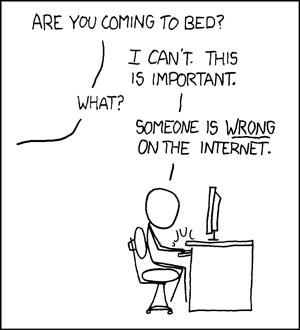 Allow me to get meta here for a moment.
Allow me to get meta here for a moment.
I’ve noticed that a very common response to nasty internet comments is to repeat the mantra, “Don’t feel the trolls.” It’s become “common knowledge” that you should ignore mean-spirited (as opposed to simply critical) comments on the internet, especially if you’re the one they’re addressed to, because people who leave such comments are only looking for a reaction from you.
Unfortunately, one side effect of this is that when someone complains about a nasty comment left on their blog or whatever, they often get a response like, “Oh, that’s not even worth thinking about. They’re just a troll. Don’t pay any attention to them.”
This response is certainly well-intentioned, and people who make it are generally trying to reassure the targeted person that the nasty comment doesn’t mean anything. However, there are several problems with it, and with the whole “Don’t feed the trolls” concept in general.
First of all, if someone’s upset about getting a nasty comment, don’t delegitimize their emotions. Feeling crappy when someone says something mean to you is a completely “normal” human thing, trust me. When someone does this in a public place (i.e. the internet) and in response to something you’ve worked hard on (a blog post, a YouTube video), it’s even more understandable that you’d feel crappy about it.
“Delegitimization” in this case refers to making people feel like their emotions aren’t legitimate–that they shouldn’t have them, or that they should just “get over” them rather than letting them run their course. That’s rarely what anyone means to do when they say things like “That’s not a big deal” and “That’s not even worth being upset over,” but that’s the effect such statements tend to have.
Furthermore, I’m no longer sure that “Don’t feed the trolls” is always the best response. True, you’re probably not going to change the person’s mind if you respond to their nasty comment. But something I’ve heard from many fellow activists is that when you write–and especially when you argue in a public forum–you’re not necessarily trying to change the mind of someone who holds the opposite position as you. Rather, you’re hoping to grab the attention of the onlooker who hasn’t really made up their mind yet, and who can definitely be swayed by a well-articulated argument.
And that’s assuming that people never change their minds once they’ve made them up, which, sometimes, they do. I’ve changed plenty of minds, and I’m really just starting to find my groove as an activist/writer.
I’ve also heard the argument that responding to nasty comments (or allowing them out of moderation, period) somehow “legitimizes” what they’re saying. First of all, I disagree that the mere act of responding to a comment makes that comment more “legitimate” regardless of the nature of your response. I don’t believe in turning the other cheek, so for me, responding to an attack is what comes naturally.
This attitude also presupposes that trolling comments are completely arbitrary, and that there’s nothing behind them other than a single person’s desire to be an asshole. That’s rarely the case. For instance, take the trolliest comment of all: “tits or gtfo,” which is often directed by men at women posting on the internet. If you dig a big deeper, you can use that meme to understand the culture that pervades certain male-dominated spaces on the internet. In these spaces–Reddit and 4chan are two noteworthy examples–men often view women as good for only one thing.
In these cases, deleting nasty comments rather than leaving them up and responding can be counterproductive. For instance, take this example, which some of my friends and I actually watched unfold yesterday. A female volunteer for the Secular Student Alliance (SSA) offered her help to one of the organization’s affiliates and was met with vile sexism. Publicizing this helps explain how sexism continues to be a problem in the secular community and leads us into a discussion of what can be done about it. (Sidenote: see the comments thread of that blog post for a great conversation about how to deal with nasty comments.)
And the upside in this situation is that people jumped into the original thread and challenged the guy who was being an asshole, and he ultimately apologized. That never would’ve happened if the people who challenged him had just shrugged and thought, “Don’t feed the trolls.”
All that said, there are certainly right and wrong ways to respond to nasty comments on the internet. Responding with anger (or, worse, hurt feelings) is exactly the kind of “feeding” that trolls actually do thrive on. The best responses are confident, snappy, and/or humorous, and show that the troll can’t get to you. One of the best comebacks I’ve ever seen was made by Alex Gabriel of the Heresy Club; someone commented, “i was searching google for circle jerk and ended up here,” and Alex responded, “Oh dear, that’s unfortunate. I can link you to some excellent porn if you’d prefer.”
Or, as my friend Kate, another badass writer and activist, says, “No, I will not feed the trolls. I will fucking trounce them and make them look like public idiots.”
None of this is to say that you should respond to nasty comments. Everyone has their own way of dealing with this sort of thing, and methodically demolishing mean-spirited arguments takes patience and energy that not everyone has all of the time. I’m merely suggesting that we should reexamine the cliche that one should never respond to trolls, not that everyone should do so all of the time.
Blogging (and other creative internet pursuits) can be exhausting and thankless. Do what feels right to you. And try not to end up like this infamous guy from xkcd:

